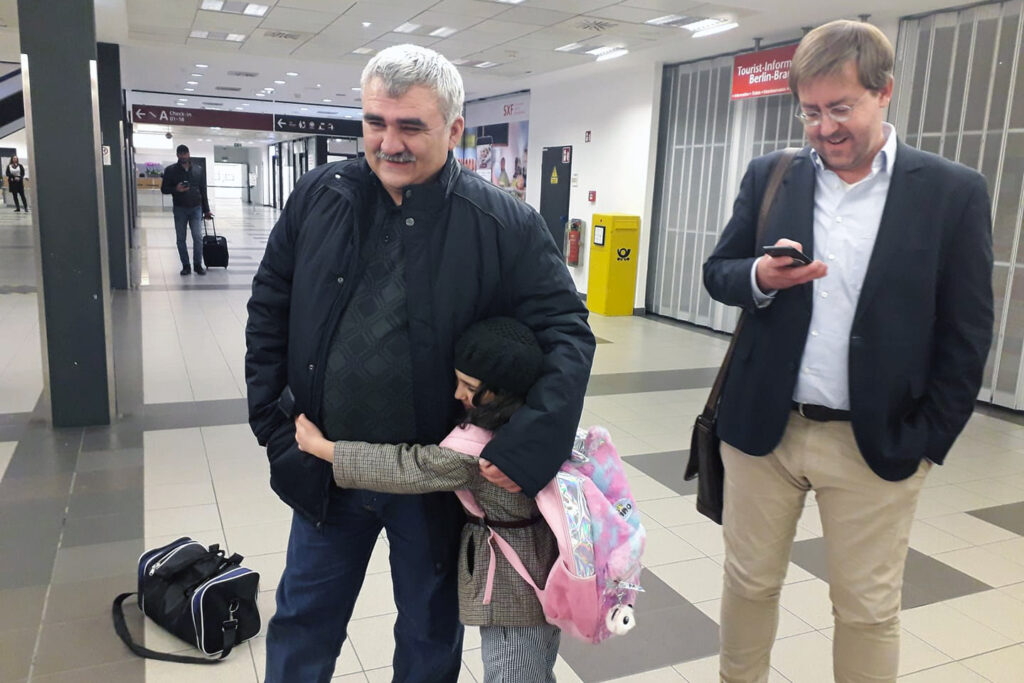Azerbaijani journalist Afgan Mukhtarli has been freed from prison in Azerbaijan where he was serving a 6-year sentence for charges widely condemned by rights groups as being trumped up.
Mukhtarli was conditionally released from the remainder of his sentence on Tuesday by the Surakhani District Court.
His lawyer, Nemat Kerimli, told RFE/RFEL that he had filed an appeal to the court earlier.
The news of Mukhtarli’s release was first shared by Mukhtarli’s brother, Ramazan Mukhtarli on Facebook on 17 March.
The news was shared by Mukhtarli’s brother, Ramazan Mukhtarli on Facebook on Tuesday.
‘My brother Afghan Mukhtarli has been released. He has been directly taken to the airport and carried to Germany’, he wrote.
Mukhtarli, a veteran investigative journalist, was charged by the Azerbaijani authorities with smuggling €10,000 in cash, illegal border crossing, and resisting police. He was sentenced in January 2018 to six years imprisonment.
His wife, Leyla Mustafayeva, wrote on Facebook following his release that ‘there are still more than 100 political prisoners in the prison’ in Azerbaijan.
The release ‘was not unexpected’
Upon arriving in Berlin, Germany on Tuesday night, Mukhtarli was welcomed in the airport by his wife Leyla Mustafayeva and their daughter, who live in Germany, and journalists.
Afgan Mukhtarli arrives to Berlin airport Source: RFE/RFEL
Mukhtarli told RFE/RL that his release was not unexpected.
‘International organisations have been involved in this issue for around a year and eventually, I was released.’
‘Just like they kidnapped me in Georgia and [then] jailed me […] I was brought from the prison secretly to the airport and delivered to Germany by plane in the same way,’
‘I should [legally] have either been deported from the country or stayed in prison. I preferred to be released, even this way, than to stay in prison’, he said.
Mukhtarli told Meydan TV he had asked the government to be allowed to stay in Azerbaijan for 10-15 days before his departure to meet with friends, but he was refused without explanation.
He told news agency Turan that the court also fined him ₼1,000 ($590).
He said that he was brought to Germany via Moscow. Tuesday was the last day flights were allowed between Baku and Moscow, before a ban over the coronavirus came into force.
Mukhtarli said he would continue his investigations ‘like before’.
‘But we have to change the methods of our fight and be more active’, he said.
‘I think that we have to once again form a group in a country bordering Azerbaijan, conduct investigations, and restore our activities in this direction’, he said.
Mukhtarli’s wife Leyla Mustafayeva told Meydan TV that ‘nothing can compensate these three years stolen from our life’.
‘His release was delayed. He should have been released earlier. Because the accusations brought against him were fabricated’, she said.
‘Abduction’ in Tbilisi
Mukhtarli disappeared in Tbilisi on 29 May 2017 on his way home after meeting a friend in a café, before resurfacing in jail in Azerbaijan the next day.
His sudden disappearance in Tbilisi led to widespread accusations that the Georgian Government was involved.
In June 2017, reporters from the OCCRP and Rustavi 2 watched two hours of CCTV footage of the route Mukhtarli took home in Tbilisi before his abduction, which according to them appeared to have been doctored.
In July 2017 Georgia suspended the head of their Border Police and Chief of Counterintelligence over the investigation into his disappearance.
After being temporarily released from prison in February 2018 to attend a memorial service for his sister and her two daughters in Zagatala, Mukhtarli repeated the accusation.
He told Georgian TV station Rustavi 2 that the Georgian authorities — including then–Prime Minister Giorgi Kvirikashvili — conspired with Azerbaijan to deliver him across the border.
His wife Leyla Mustafayeva claimed his compassionate release was cut short at the request of Georgian authorities after he spoke with Rustavi 2.

Mukhtarli also told Rustavi 2 he had been investigating business ties between Azerbaijani President Ilham Aliyev and former Georgian Prime-Minister, the current head of the ruling Georgian Dream party, Bidzina Ivanishvili.
In September 2019, Mukhtarli went on hunger strike in Azerbaijan and stopped taking his medication in protest against his the ‘mistreatment’ of his lawyer at the hands of prison officials.
International outcry
Mukhtarli’s abduction in Georgia and conviction in Azerbaijan was roundly condemned by rights groups, both local and international. This included the Institute for Reporters’ Freedom and Safety, Human Rights Watch, Amnesty International, and Freedom House.

Then–US Ambassador to Georgia Ian Kelly described suspicion of the Georgian government’s involvement in the abduction as 'serious’ and 'troubling' allegations.
The US State Department released a statement urging the Azerbaijani government ‘to release all those incarcerated for exercising their fundamental freedoms in accordance with its international and OSCE commitments’, adding that they were ‘closely following the Georgian investigation into the reported abduction’, urging that ‘it be full, transparent, and timely’.
The statement also mentioned the arrest of Deputy Chairperson of the opposition Popular Front Party, Gozal Bayramli, who was detained for alleged smuggling of money while crossing the Georgian-Azerbaijani border on 26 May 2017.
On 15 June, the European Parliament passed a resolution urging Georgia to conduct a ‘prompt, thorough, transparent and effective investigation’, to bring the perpetrators to justice, and ‘clarify beyond any doubt all suspicion regarding the involvement of Georgian state agents in the forced disappearance’.




 17 March 2020
17 March 2020



